MercoPress. South Atlantic News Agency
Tag: Workers' Party (Brazil)
-
Thursday, July 17th 2014 - 05:24 UTC
Brazil’s main October presidential battle will take place in Sao Paulo
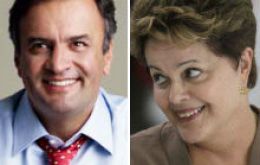
When opposition party Senator Aecio Neves officially kicked off his presidential campaign last week, he posted a video on Facebook calling for a “fairer, more efficient, and more generous Brazil”. However the word ‘efficient’ struck some as an odd rallying cry in a tropical country known for its, well, un-Swiss-like approach to time.
-
Monday, June 23rd 2014 - 03:52 UTC
Rousseff-Temer make official their re-election bid for 5 October
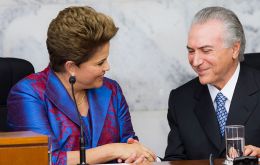
The ruling Workers Party, or PT, Latin America's largest political force of the left that has governed Brazil since 2003, proclaimed Saturday at its national convention the candidacy of President Dilma Rousseff for a second term in the coming Oct. 5 elections.
-
Thursday, June 5th 2014 - 07:20 UTC
High inflation and unemployment challenging Brazilian economy in election year
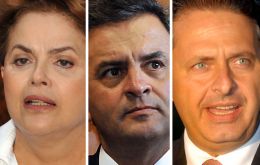
With the World Cup just eight days away, high inflation and unemployment is once again challenging Brazil’s economy, with the impact sure to influence this year’s election campaigns. Investors warned earlier this week that spending promises will undermine the fiscal discipline needed to restore confidence in the country and boost economic growth.
-
Thursday, May 1st 2014 - 07:08 UTC
Rousseff bids for re-election and announces benefits for her electoral base

President Dilma Rousseff said on Wednesday she will seek re-election in October, even though some are calling for the return of her popular predecessor president Lula da Silva. Rousseff, who belongs to Lula's Workers Party and was his protegée, said she hoped to have the support of all the parties allied with her government.
-
Monday, March 10th 2014 - 21:43 UTC
Rousseff's supporters fit the most with the profile of the average Brazil voter

The average Brazilian voter for this coming October presidential election is between 25 and 34 years old, has on average a high school education and a low monthly family income, equivalent to 618 US dollars. He lives in the Southeast region of the vast country, in a small town with fewer than 50,000 inhabitants.
-
Monday, January 6th 2014 - 06:48 UTC
Brazilian opposition ready to present attractive, balanced presidential ticket
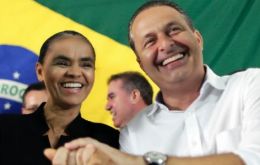
Former Brazilian environment minister Marina Silva has agreed to run for vice president in October elections on the presidential ticket of Eduardo Campos, the governor of Brazil’s Pernambuco state, O'Globo newspaper reported. Silva, who will make her intention publicly known by mid-February, could announce her candidacy at a January 17 meeting of leaders of Campos’ Brazilian Socialist Party (PSB).
-
Thursday, November 14th 2013 - 18:17 UTC
Brazil politics fat cats to jail confirms the Supreme Court in landmark judgment

In a landmark judgment, Brazil's Supreme Court on Wednesday upheld more than a dozen jail terms handed down in a political corruption scandal which broke in 2005.
-
Monday, October 7th 2013 - 14:27 UTC
Powerful alliance (ecologists and business) emerges to challenge Rousseff

Environmentalist Marina Silva announced that she will not run for the Brazilian presidency in the 2014 polls, and instead will back Eduardo Campos, who will be the nominee for the Brazilian Socialist Party (PSB).
-
Thursday, September 19th 2013 - 21:23 UTC
Brazilian presidential hopeful steps down from Rousseff’s coalition
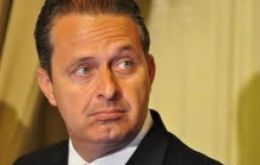
Eduardo Campos, one of Brazil's most popular state governors, came one step closer to a presidential bid this week when his party withdrew from President Dilma Rousseff's seventeen parties’ coalition government. The Brazilian Socialist Party decided to pull its two ministers from Rousseff's cabinet to give Campos freedom to run in elections in October 2014.
-
Tuesday, July 23rd 2013 - 08:00 UTC
Polls confirm support for Rousseff has crashed and Lula da Silva becomes an option

Former president Lula da Silva is back leading opinion polls as the most likeable candidate for Brazil’s presidential election in 2014, eleven percentage points ahead of his successor and current president Dilma Rousseff according to the latest public opinion polls released over the week end.
